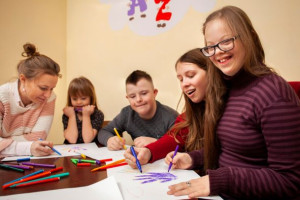Prog Card
Programme Details
Introduction
The Master of Teaching in Inclusive and Special Education programme will enable qualified, experienced teachers to develop specialist knowledge and skills in inclusive practices in classrooms. The aim of the programme is to develop participating teachers' knowledge and skills in analysing, critiquing and applying research literature in the area of special and inclusive education, and in carrying out research relevant to children and young people with learning difficulties, additional support or special educational needs.
Additionally, participants will develop knowledge of key concepts and issues related to inclusive education, enhancing their understanding of disciplinary and theoretical perspectives. It will give students the ability to analyse, evaluate, synthesise evidence, and help them to apply conceptual and theoretical frameworks to policy and practice.
General Entry Criteria
A related Bachelor’s Degree OR
A related Graduate Diploma at Level 8
Note: “Related” implies that the applicant should have either an MNQF level 7 or level 8 qualification in Education/teaching or a similar area.
Alternative Criteria
25 years old, completion of a related Level 5 qualification, and 7 years of relevant experience (of which 3.5 years of experience is obtained after completion of a Level 5 qualification), and completion of an MQA approved Pre-Master’s Programme. OR
25 years old, completion of a related Level 6 qualification, and 6 years of relevant experience (of which 3 years of experience is obtained after completion of a Level 6 qualification), and completion of an MQA approved Pre-Master’s Programme.
Core Modules
Semester 1
Promoting Successful Learning
Assessment and Monitoring in Inclusive and Special Education
Curriculum and Pedagogy for Inclusive Education
Semester 2
Interventions for Inclusion of Children with Complex Learning Profiles
Educational Research
Eligible for Interim Award Postgraduate Certificate in Education (Inclusive and Special Education) upon completion of any 3 modules from above
The modules below are offered year-long (Semester 2 & 3)
Option 1: (route for teachers with teaching qualifications)
Dissertation
Option 2: (route for teachers without teaching qualifications)
Professional Experience AND
Action Research OR
Capstone Project
Award Master of Teaching in Inclusive and Special Education
Additional InformationIn Accordance to MQA circular number: 218-Accred/CIR/2024/2 students enrolling to the programme with a subject degree (without an education / teaching degree) would follow route 2. All modules and exams would be conducted in face-to-face modality for these students. This information would be shared during the registration stage.
- Course fee: MVR 4,350 per month x 15 months
Upon successful completion of this programme participants will be able to:
Demonstrate an understanding of the philosophical views and legislative structures, which drive inclusive education both nationally and internationally,
Accommodate students with additional learning needs within regular classrooms,
Establish learning environments which value diversity, recognize difference and encourage student engagement,
Apply inclusive practices, including supportive and differentiated strategies to enable student progress,
Identify and implement interventions that facilitate and support inclusive education,
Demonstrate critical thinking through engagement with current research in the field,
Work collaboratively and autonomously to undertake responsibilities at a professional level in both teaching and leadership,
Understand current thinking on best practices in education, and apply and develop best practices for the benefit of the teaching and learning community,
Enable critical evaluation of learning in a variety of contexts and identify relevant theoretical, professional and/or research-based sources and use these appropriately in study and/or professional practice,
Identify relevant theoretical, professional and/or research-based sources and use these appropriately in study and/or professional practice in a variety of contexts,
Develop positive professional relationships with students, other teachers/educators and stakeholders in various aspects of education in order to improve practice and raise achievement,
Take independent and self-critical responsibility for own work, guiding the learning of others and managing their own requirements for continuing professional development,
Communicate effectively with a broad range of audiences including learners and other professionals, and Critically understand the significance of issues of equality, diversity, inclusion, and social justice related to educational policies and practice.
